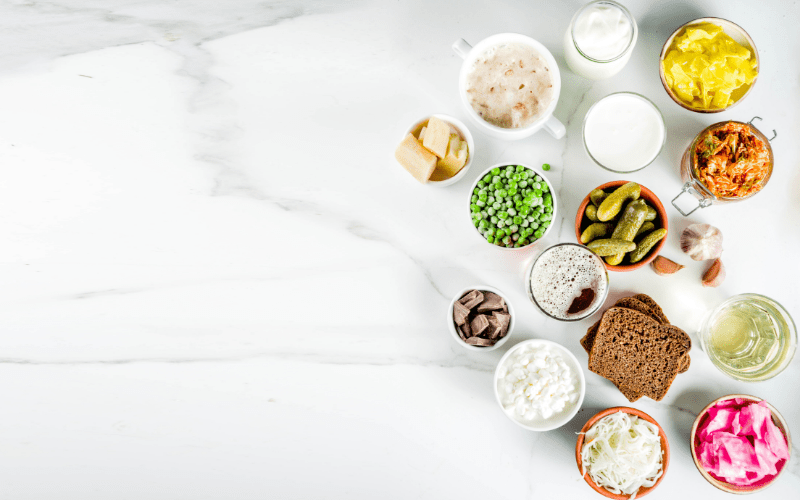Probiotics are live microorganisms or bacteria that live in your gut and make up your microbiome. They have many proven health benefits that extend far beyond digestive health.
You can get more probiotics into your diet by eating fermented foods, such as sauerkraut, kefir, miso, yogurt, sour cream, sourdough bread, and tempeh.
However, research shows that taking a high-dose probiotic, such as SolPro 225, yields better results than lower dose supplements, including those that are naturally occurring in foods.
Here are the top health benefits of probiotics, backed by scientific studies.
#1 – They reduce the symptoms of GI disorders.
Taking a probiotic can help improve digestive health, which is important because your gut is where your microbiome and most of your immune cells live.
Probiotics also tend to have a soothing effect on the gut to help promote regularity and reduce digestive upset, including constipation, diarrhea, gas, bloating, and indigestion.
Research shows that probiotics can help alleviate the symptoms of the following digestive disorders:
- Antibiotic-associated diarrhea (AAD)
- Clostridium difficile colitis (CDC)
- Infectious diarrhea
- Inflammatory bowel disease (IBD)
- Ulcerative colitis
- Crohn’s disease
- Pouchitis
- Irritable bowel syndrome (IBS)
Probiotics have also been found to be useful for other GI disorders, including lactose intolerance, microscopic colitis, diverticulitis, Helicobacter pylori infections, and even colon cancer.
#2 – They help boost immunity.
Research shows that probiotics can help boost immunity to protect against chronic diseases and viral infections.
They work by regulating the functions of the intestinal epithelial cells and mucosal and systemic immune cells. They can also help boost antibody responses to vaccinations, making them more effective.
According to one study, probiotics may also be used to prevent the common cold. Another study found that they can help protect against bacterial and viral infections, including respiratory tract infections, and may act as a potential therapeutic approach for reducing the cytokine storms associated with COVID-19.
Additionally, lactic acid bacteria has been shown to produce bioactive molecules called bacteriocins that contain antimicrobial properties to help fight bacterial infections.
#3 – They support mood, sleep, and brain health.
Your brain and your digestive system are in constant communication throughout the day. This is possible through your vagus nerve, which extends from the brain all the way to your abdomen.
The vagus nerve’s job is to send signals from your brain to your gut and vice versa. When your digestive system is inflamed, it sends distress signals to your brain, which affects your mood, memory, and cognitive function.
Probiotics help calm these distress signals by reducing inflammation in the gut, which has been shown to strengthen the gut-brain axis and help boost mood and cognitive function.
One study found that a group of people who were given a mixture of probiotics for six weeks had significant improvements in mood, such as reduced depression, anger, and fatigue. They also experienced improvements in sleep quality.
Probiotics may also fight brain aging that leads to neurodegenerative disorders, such as Alzheimer’s and Parkinson’s diseases. Research shows that probiotics help prevent the harmful effects of aging that lead to neurodegenerative diseases, such as decreased neurotransmitter levels, oxidative stress, and chronic inflammation.
#4 – They may assist with weight loss and blood sugar control.
Obesity and diabetes, like many other conditions, are inflammatory disorders. Probiotics positively contribute to the health of your gut microbiota, which reduces inflammation and can protect against these disorders.
According to one study, probiotics have physiologic functions that support gut microbiota health and can affect appetite and food intake, body weight and composition, and the modulation of the metabolic functions through gastrointestinal pathways and gut bacteria.
Additionally, research shows that people with type 2 diabetes who took probiotics improved their HbA1c and fasting insulin levels.
#5 – They help keep your heart healthy.
Research shows that all lactobacilli and bifidobacteria probiotic strains have cholesterol-lowering abilities. They work by assimilating cholesterol, binding it to the cellular surface, interfering with the intestinal absorption of cholesterol, and through bile acid deconjugation.
Due to their abilities to lower cholesterol and lower blood sugar levels, probiotics may be able to reduce the risk of coronary heart disease.
 #6 – They promote skin health.
#6 – They promote skin health.
Taking a daily probiotic can help keep your skin healthy. According to one study, probiotics can help improve eczema, scars and wound healing, and also assist with skin rejuvenation.
#7 – They encourage oral health and fight cavities.
Research shows that probiotics can help keep your mouth and gums healthy. One study found that probiotics can be used to prevent oral diseases, such as halitosis (bad breath), periodontal infections, and dental caries.
#8 – They may help you live longer.
Probiotics can help fight the onset of chronic disease, which may potentially help you live longer. According to one study, flies that were given a probiotic along with a polyphenol-rich supplement lived 60 percent longer and were more protected from chronic disease.
Researchers of the study stated that a single probiotic formulation acts on several biochemical signaling pathways to deliver a broad range of beneficial effects. They concluded that fruit flies are about 70 percent similar to mammals in terms of biochemical pathways, which suggests that similar results may occur in humans.
#9 – They may help improve autism.
Research shows that children with autism have an abnormal microbial community that is also reported in many GI disorders, such as irritable bowel disease and irritable bowel syndrome.
One study found that children with autism also have impaired carbohydrate digestion. Parents of children with autism may notice that their children also complain of digestive symptoms.
The administration of probiotics may help alleviate autistic symptoms by reducing gut inflammation and supporting the health of the microbiome, according to several studies.
#10 – They help restore healthy bacteria after a round of antibiotics.
Antibiotics are sometimes necessary to treat bacterial conditions. However, some people experience side effects that may include diarrhea, nausea, loss of appetite, abdominal pain, and bloating.
This is because antibiotics are designed to kill all the bacteria in your body that might be causing an infection, even the good bacteria. Probiotics help restore the delicate balance of healthy bacteria to reduce these symptoms.

